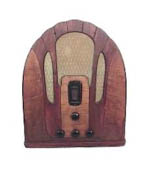Grand theories about upheavals on the internet horizon are in ready supply. Singularities are near. Explosions can be expected in the next six to eight months. Or the whole thing might just get “flushed” down the tubes. This last scenario is described at length in a recent essay in Linux Journal by Doc Searls, which predicts the imminent hijacking of the net by phone and cable companies who will turn it into a top-down, one-way broadcast medium. In other words, the net’s utopian moment, the “read/write” web, may be about to end. Reading Searls’ piece, I couldn’t help thinking about the story of radio and a wonderful essay Brecht wrote on the subject in 1932:

Here is a positive suggestion: change this apparatus over from distribution to communication. The radio would be the finest possible communication apparatus in public life, a vast network of pipes. That is to say, it would be if it knew how to receive as well as to transmit, how to let the listener speak as well as hear, how to bring him into a relationship instead of isolating him. On this principle the radio should step out of the supply business and organize its listeners as suppliers….turning the audience not only into pupils but into teachers.
Unless you’re the military, law enforcement, or a short-wave hobbyist, two-way radio never happened. On the mainstream commercial front, radio has always been about broadcast: a one-way funnel. The big FM tower to the many receivers, “prettifying public life,” as Brecht puts it. Radio as an agitation? As an invitation to a debate, rousing families from the dinner table into a critical encounter with their world? Well, that would have been neat.
Now there’s the internet, a two-way, every-which-way medium — a stage of stages — that would have positively staggered a provocateur like Brecht. But although the net may be a virtual place, it’s built on some pretty actual stuff. Copper wire, fiber optic cable, trunks, routers, packets — “the vast network of pipes.” The pipes are owned by the phone and cable companies — the broadband providers — and these guys expect a big return (far bigger than they’re getting now) on the billions they’ve invested in laying down the plumbing. Searls:
The choke points are in the pipes, the permission is coming from the lawmakers and regulators, and the choking will be done….The carriers are going to lobby for the laws and regulations they need, and they’re going to do the deals they need to do. The new system will be theirs, not ours….The new carrier-based Net will work in the same asymmetrical few-to-many, top-down pyramidal way made familiar by TV, radio, newspapers, books, magazines and other Industrial Age media now being sucked into Information Age pipes. Movement still will go from producers to consumers, just like it always did.
If Brecht were around today I’m sure he would have already written (or blogged) to this effect, no doubt reciting the sad fate of radio as a cautionary tale. Watch the pipes, he would say. If companies talk about “broad” as in “broadband,” make sure they’re talking about both ends of the pipe. The way broadband works today, the pipe running into your house dwarfs the one running out. That means more download and less upload, and it’s paving the way for a content delivery platform every bit as powerful as cable on an infinitely broader band. Data storage, domain hosting — anything you put up there — will be increasingly costly, though there will likely remain plenty of chat space and web mail provided for free, anything that allows consumers to fire their enthusiasm for commodities through the synapse chain.
 If the net goes the way of radio, that will be the difference (allow me to indulge in a little dystopia). Imagine a classic Philco cathedral radio but with a few little funnel-ended hoses extending from the side that connect you to other listeners. “Tune into this frequency!” “You gotta hear this!” You whisper recommendations through the tube. It’s sending a link. Viral marketing. Yes, the net will remain two-way to the extent that it helps fuel the market. Web browsers, like the old Philco, would essentially be receivers, enabling participation only to the extent that it encouraged others to receive.
If the net goes the way of radio, that will be the difference (allow me to indulge in a little dystopia). Imagine a classic Philco cathedral radio but with a few little funnel-ended hoses extending from the side that connect you to other listeners. “Tune into this frequency!” “You gotta hear this!” You whisper recommendations through the tube. It’s sending a link. Viral marketing. Yes, the net will remain two-way to the extent that it helps fuel the market. Web browsers, like the old Philco, would essentially be receivers, enabling participation only to the extent that it encouraged others to receive.
You might even get your blog hosted for free if you promote products — a sports shoe with gelatinous heels or a music video that allows you to undress the dancing girls with your mouse. Throw in some political rants in between to blow off some steam, no problem. That’s entrepreneurial consumerism. Make a living out of your appetites and your ability to make them infectious. Hip recommenders can build a cosy little livelihood out of their endorsements. But any non-consumer activity will be more like amateur short-wave radio: a mildly eccentric (and expensive) hobby (and they’ll even make a saccharine movie about a guy communing with his dead firefighter dad through a ghost blog).
Searls sees it as above all a war of language and metaphor. The phone and cable companies will dominate as long as the internet is understood fundamentally as a network of pipes, a kind of information transport system. This places the carriers at the top of the hierarchy — the highway authority setting the rules of the road and collecting the tolls. So far the carriers have managed, through various regulatory wrangling and court rulings, to ensure that the “transport metaphor” has prevailed.
But obviously the net is much more than the sum of its pipes. It’s a public square. It’s a community center. It’s a market. And it’s the biggest publishing system the world has ever known. Searls wants to promote “place metaphors” like these. Sure, unless you’re a lobbyist for Verizon or SBC, you probably already think of it this way. But in the end it’s the lobbyists that will make all the difference. Unless, that is, an enlightened citizens’ lobby begins making some noise. So a broad, broad as in broadband, public conversation should be in order. Far broader than what goes on in the usual progressive online feedback loops — the Linux and open source communities, the creative commies, and the techno-hip blogosphere, that I’m sure are already in agreement about this.
Google also seems to have an eye on the pipes, reportedly having bought thousands of miles of “dark fiber” — pipe that has been laid but is not yet in use. Some predict a nationwide “Googlenet.” But this can of worms is best saved for another post.

Two-way radio could have been a complete disaster. As McLuhan noticed, holding a conversation over the phone, which is a voice-centric communication, is always a delicate affair and a source of profound misunderstanding, the main argument being that too much focus is put on the incoming information and no space is left for thinking.
Moreover, the involvement of radio in major conflicts and ethnic cleansing is often outspoken and used as a two-way communication device, it has the potential to wreak havocs. No wonder that it is mainly used by the military and law enforcement personnel.
In 1997, Henry Jenkins wrote a piece on the relationship between the internet and early radio: “Contacting The Past: Early Radio and the Digital Revolution”. There, he also argued that the web as he knew it was about to go the way of two-way radio:
There are early warning signs that something similar might happen to digital culture — the overloading of AOL, the Communication’s Decency Act, increased government interest in regulating cyberspace, the growth of push-advertising, and the development of low cost technologies which enable us to point-and-click but not to type (great for home shopping, poor for cyber democracy). While we’ve been busy celebrating the net’s participatory dimensions, corporate mergers concentrated most of our national media resources — newspapers, radio stations, television networks, cable outlets, film production companies, etc. — in the hands of four or five major multinational conglomerates such as Viacom and Warners Communications Inc. This media concentration expands the rule of cultural gatekeepers over what messages get into broad circulation, even if we can now speak back in cyberspace.
The analogy between the web and ham radio is a fruitful one, but it’s also important to remember the historical circumstance that brought about the end of two-way radio — it didn’t slowly fade into oblivion, but rather was pretty much snuffed out by the first World War. As Ben notes, the Navy had been tussling with hams for a while by the time the war got underway, and no one really questioned the decision to shut down ham stations by government order (even the hams applauded the decision: many became wartime radio operators). When the war was over, the Navy actually had no plans to give ANY of the airwaves back to “the public”; it was only the intervention of Congress that stopped them from permanently commandeering the medium. But in the eyes of Congress, “the public” wasn’t the ham operator. Instead, the business interests that were poised to take over the airwaves were best suited to protect the public interest. Hams got their home-brew stations back for a while, but eventually government restrictions chased them to the far corners of the bandwith. By that time, the public had pretty much tired of them anyhow: hams were seen as parasites, using a “public” resource for private enjoyment.
What can we take from this further bit of history? Maybe another caveat: that we need to pay attention to the way the “public” is being defined in current debates about the future of the internet. Is the assumed “public” for internet 2.0, for example, the same “public” as the public for internet 1.0? Is there a chance that corporate or government pressure will eventually lead us to redefine an activity we consider to be part of the “public” life of the internet (such as blogging) as a frivolous private indulgence?
In emergencies or in remote areas, however, ham radio enthusiasts are often conscripted to take over when phone lines are down and other connections are blocked.
Also that level of involvement in broadcasting always presumed a level of broadcasting ‘literacy’ which translates roughly in the digital sphere as ‘information literacy’. One would have to tie up an awful lot of pipes before people gave up being prosumers completely, and they will not give up trying to use the knowledge they have acquired. And would techies cave in so completely anyway? the open source movement is so strong, I doubt it could be stopped that easily.